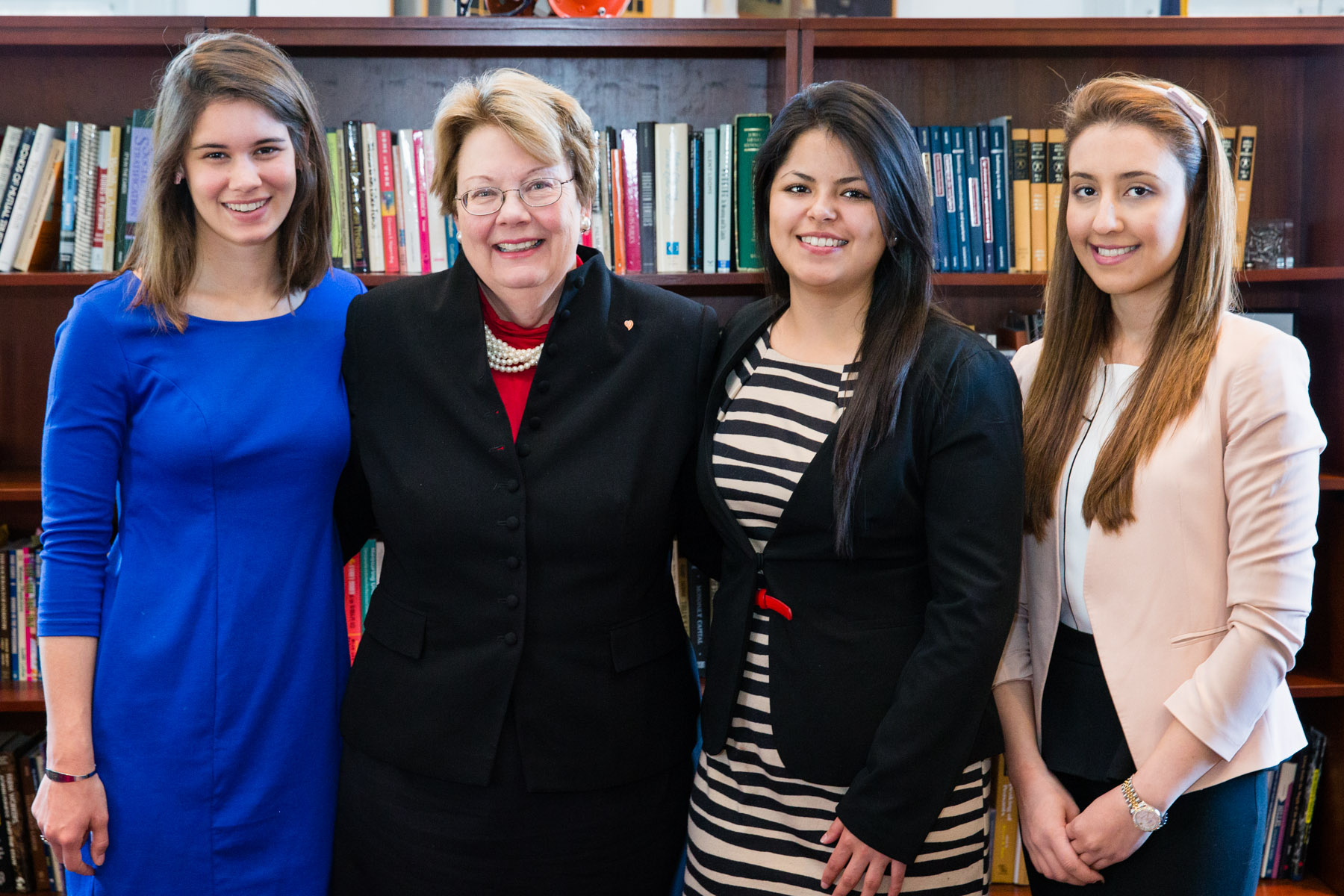These interns do not go on coffee runs.
Mia Brown, Niloufar Dodangeh and Perla Vitela – all fourth-year sociology majors in the University of Virginia’s College of Arts & Sciences – were this year’s spring presidential interns. The three were nominated by sociology faculty members and selected after a competitive application process to work in U.Va.’s Office of the President, sometimes closely with President Teresa A. Sullivan – perhaps the University’s best-known sociologist.
Sullivan began the program in 2011, remembering having had a similar experience interning for Michigan State University's president soon after her college graduation.
“These internships allow students to gain work experience in the president’s office, while my colleagues and I benefit greatly from having them with us for a semester,” Sullivan said.
The interns rotated through three different presidential areas – strategic planning, the Board of Visitors office and major events – to gain a working knowledge of U.Va.’s administration.
“Being able to attend staff meetings, we really got to hear how they’re planning the future of the University,” Vitela said. “All the things and planning that go into running the University, I had never really thought about before. It has been very eye-opening.”
“Like their predecessors, this year’s interns have brought the undergraduate perspective to Madison Hall, helping us to better understand the interests of students,” Sullivan said. “Their varied backgrounds, experiences and academic interests have given us insight into their lives and the lives of their classmates.”
The interns also brought an international perspective. Dodangeh, 22, from Tehran, Iran, is the first international student to be selected for the internship.
“As an international student, this internship helped me feel more personally connected to the University,” she said. “I got to see and be a part of the involvement behind the scenes, and it really made U.Va. feel like my second home.”
Vitela’s background is also international. She spent her early childhood in a rural town in Michoacán, a state in the western center of Mexico, before moving to Woodbridge when she was 5 years old.
During their internships, Brown, Dodangeh and Vitela also wrote research papers on sociological issues in the U.Va. community that Sullivan read and critiqued.
“I have especially enjoyed my discussions with Mia, Nilou and Perla about their research papers,” Sullivan said.
“She’s a prominent sociologist, so we really appreciated her input and feedback,” Brown said.
Brown, a 21-year-old from Alexandria majoring in American studies and sociology, wrote her research paper on obstacles to service learning at U.Va.
“Service learning classes are academic classes where a piece of the curriculum is community service,” she said. “President Sullivan wanted me to focus on why more people don’t do them. I found that a lot of the blockages were institutional, like financial funding because these programs are typically more expensive than a traditional class. Professors are also reluctant to teach them because service learning classes are not looked at valuably for tenure tracks.”
Dodangeh studies psychology as well as sociology and wrote her paper on alcohol abuse among U.Va undergraduates.
Her research showed that U.Va.’s culture contributes to and promotes alcohol abuse, but that pressure to conform to the norms of peer groups, social rewards associated with drunkenness, a perceived lack of major consequences and stress associated with the ”work hard, play hard” mentality contribute to student drinking as well. Vitela, 22, a sociology and foreign affairs major, focused her research on the causes behind unsatisfactory outcomes from volunteering, both for the volunteer and also for the host organization. She looked at student volunteers, the communities being served and service organizations, and why it may be hard to motivate volunteers or why some volunteers fail to show up to their committed shift or event.
“Many people volunteer, and I have had volunteer opportunities that have been good and others that didn’t go as expected, so I wanted to see why,” said Vitela, who also wrote a distinguished major thesis in sociology on the Hispanic response to an immigration ordinance in Northern Virginia’s Prince William County. That research will be included in an article sociology associate professor Milton Vickerman and Thomas Guterbock, the director of U.Va.’s Center for Survey Research, are writing.
After graduation, Brown plans to pursue a master’s degree in macro-social work at Washington University in St. Louis. She will be focusing on social and economic development and hopes to pursue a career in education or social policy.
Dodangeh has been accepted to a one-year master’s program for non-business majors at U.Va’s McIntire School of Commerce. After receiving her M.S. in commerce, she plans to return to Iran to help run her family’s company. Vitela has no definite plans yet, but hopes to work with low-income minority populations, either for a career or as a volunteer. She wants to try teaching, though sees herself working more in administration, social policy or law, where she feels she can make a broader impact.
“All three of these students have bright futures ahead of them,” Sullivan said.
As they leave U.Va., Brown, Dodangeh and Vitela say they now see and understand the University more fully.
“We have good people running the University,” Brown said.
Media Contact
Article Information
May 12, 2013
/content/class-2013-undergraduate-interns-bring-diverse-perspectives-president-s-office

